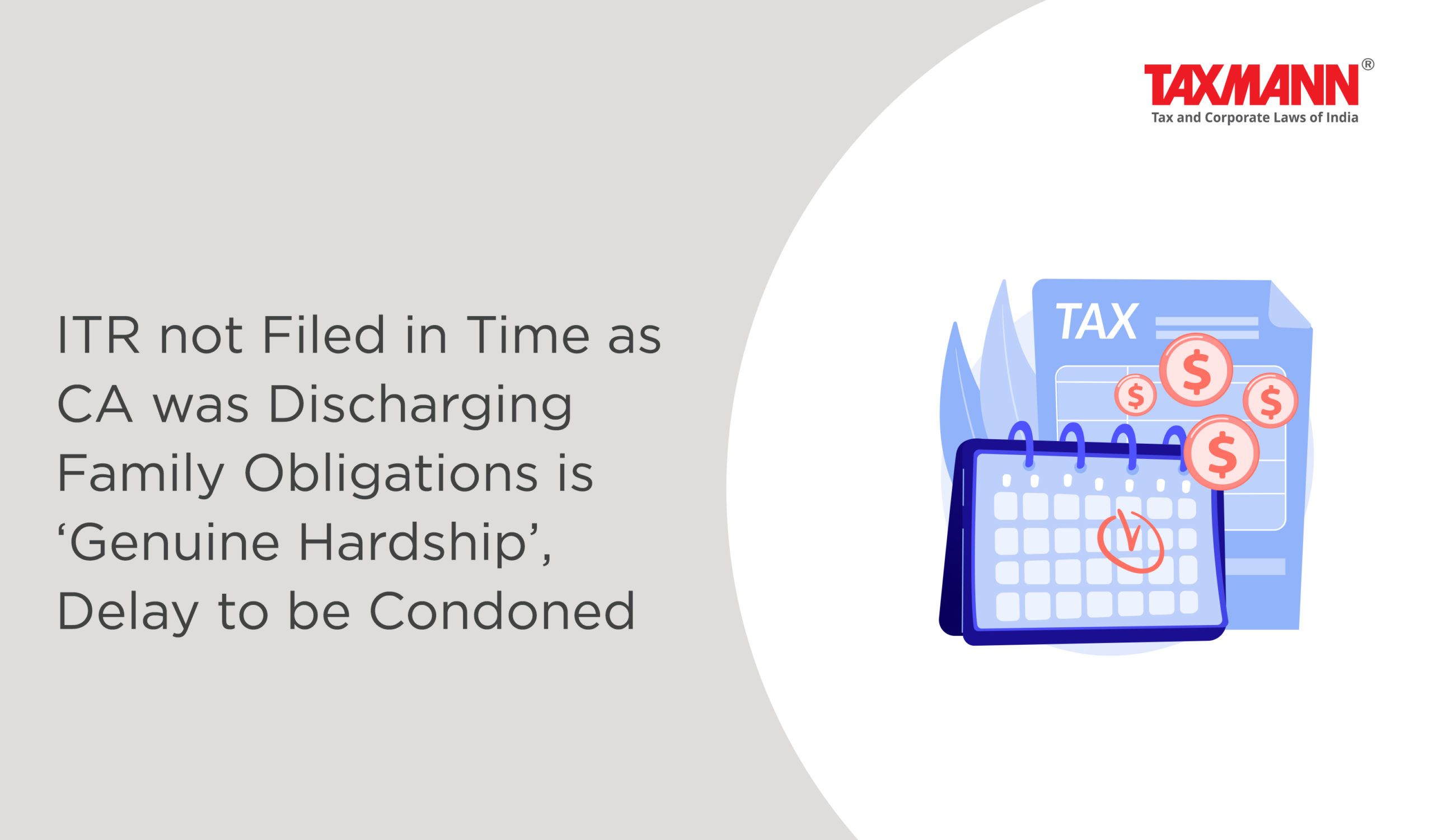ITR not Filed in Time as CA was Discharging Family Obligations is ‘Genuine Hardship’, Delay to be Condoned
- Blog|News|Income Tax|
- 2 Min Read
- By Taxmann
- |
- Last Updated on 15 June, 2023

Case Details: ADCC Infocom (P.) Ltd. v. Principal Chief Commissioner of Income-tax - [2023] 150 taxmann.com 529 (Bombay)
Judiciary and Counsel Details
-
- A.S. Chandurkar & M.W. Chandwani, JJ.
- Atharva S. Manohar, Adv. for the Petitioner.
- Anand Parchure & B.N. Mohata, Advs. for the Respondent.
Facts of the Case
Assessee-company, engaged in the business of Geospatial and Engineering Services, suffered losses in its business. Since it suffered the loss in the relevant year, it was required to file its return of income before the due date prescribed under section 139(1) in order to carry forward such losses. However, the assessee failed to furnish the return of income within the prescribed time limit and filed the same after a delay of 36 days.
Subsequently, the assessee filed an application for condonation of delay of 36 days before Principal Chief Commissioner of Income Tax (PCCIT) along with an affidavit by its Chartered Accountant (CA) demonstrating that the delay was due to family obligations of its CA. Considering it not the case of ‘genuine hardship’, PCCIT rejected the assessee’s application for condonation of delay.
Aggrieved-assessee filed a writ petition before the Bombay High Court.
High Court Held
The Court held that the Central Board of Direct Taxes (Board) is vested with the power under section 119(2)(b) to admit an application or claim for any exemption, deduction, refund or any other relief under the Act after the expiry of the period specified under the Act where the Board considers it desirable or expedient so to do for avoiding genuine hardship. The Board issued various instructions in the form of Circulars, and latest by Circular No. 9/15, dated 9-6-2015. Therefore, while considering the application for condonation of delay, the authority is required to consider the genuine hardship.
The phrase genuine hardship would, inter alia, mean genuine difficulty, and it should be construed liberally, particularly in matters of entertaining applications seeking condonation of delay.
Further, there is a statement on oath of the assessee’s CA contending that she was discharging her family obligations which was neither disputed nor controverted by the PCCIT. She has taken responsibility for the delay mentioning that there was a failure on her part to file the return of the assessee before the due date. It is a settled principle that for the mistake on the part of the professionals, the litigant should not suffer. In addition, the delay is only of 36 days, and there is no allegation of mala fide or deliberate delay on the part of the assessee.
Thus, the delay in filing the return deserves to be condoned.
List of Cases Reviewed
-
- B.M.Malani v. CIT [2008] 174 Taxman 363/306 ITR 196 (SC) (para 14)
- Sitaldas K Motwani v. Dy. CIT [2010] 187 Taxman 44 (Bom.) (para 14)
- Subhkaran & Sons v. N.A. Kazi 1984 SCC Online Bom 411 (para 13) followed.
List of Cases Referred to
-
- B.M.Malani v. CIT [2008] 174 Taxman 363/306 ITR 196 (SC) (para 8)
- Sitaldas K Motwani v. Director General of Income Tax (International Taxation) [2010] 187 Taxman 44 (Bom.) (para 9)
- Subhkaran & Sons v. N.A. Kazi 5th ITO 1984 SCC Online Bom 411 (para 13).
Disclaimer: The content/information published on the website is only for general information of the user and shall not be construed as legal advice. While the Taxmann has exercised reasonable efforts to ensure the veracity of information/content published, Taxmann shall be under no liability in any manner whatsoever for incorrect information, if any.

Taxmann Publications has a dedicated in-house Research & Editorial Team. This team consists of a team of Chartered Accountants, Company Secretaries, and Lawyers. This team works under the guidance and supervision of editor-in-chief Mr Rakesh Bhargava.
The Research and Editorial Team is responsible for developing reliable and accurate content for the readers. The team follows the six-sigma approach to achieve the benchmark of zero error in its publications and research platforms. The team ensures that the following publication guidelines are thoroughly followed while developing the content:
- The statutory material is obtained only from the authorized and reliable sources
- All the latest developments in the judicial and legislative fields are covered
- Prepare the analytical write-ups on current, controversial, and important issues to help the readers to understand the concept and its implications
- Every content published by Taxmann is complete, accurate and lucid
- All evidence-based statements are supported with proper reference to Section, Circular No., Notification No. or citations
- The golden rules of grammar, style and consistency are thoroughly followed
- Font and size that’s easy to read and remain consistent across all imprint and digital publications are applied



 CA | CS | CMA
CA | CS | CMA
